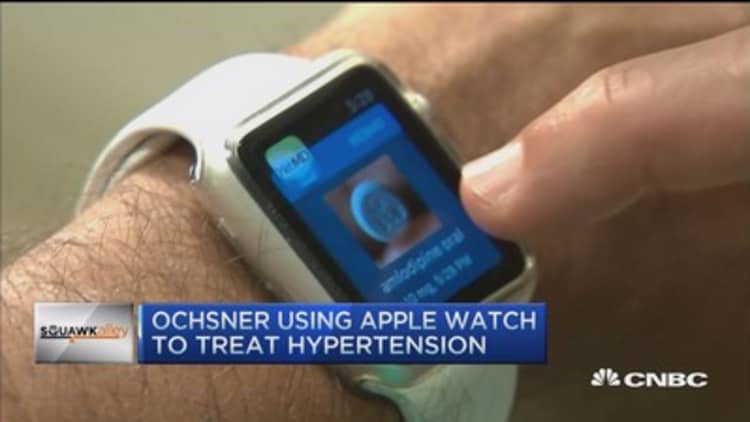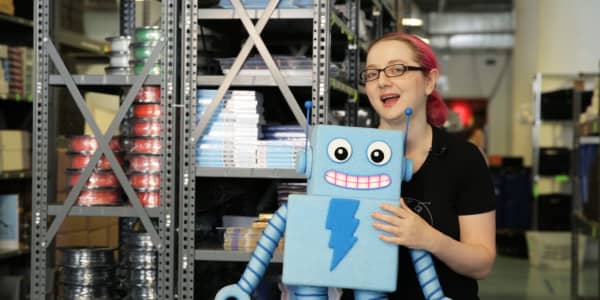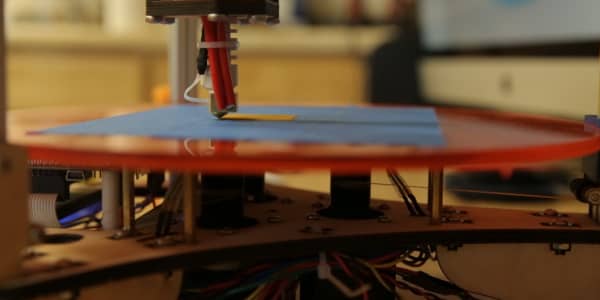
John Hogue has struggled with his weight for years. He knew diet and exercise could help bring his diabetes and blood pressure under control, but admits he was never one to count calories.
"I would go to the doctor and say 'yes, sir' and listen to all the good advice, and then I would go down the street and have a po' boy," the 53-year-old attorney said with a laugh.
That changed last fall, when his doctor at New Orleans' Ochsner Health System prescribed some mobile apps he could use on his phone to watch his glucose levels, monitor his blood pressure and closely track his diet.
Read MorePassing the health-care buck
"I still struggle with my weight, honestly, but it's made me more aware of what I'm eating," and Hogue said that has helped. "I'm managing my blood pressure better."
Nonprofit Ochsner is making mobile technology part of its protocol to treat patients with chronic diseases. Doctors now write out prescriptions for apps that patients can take to its "O Bar," where they find tech advisors to help install the applications on their phones and show them how to use them before they go home.
"There's over 100,000 health and wellness apps in the market and there's data to say that up to 50 percent of them are not very useful," said Dr. Richard Milani, vice chairman of cardiology, who also directs the new technology program as chief clinical transformation officer at Ochsner. "We'd like to be able to feature the ones that we've found have been helpful to patients."
This spring, Ochsner started testing the Apple Watch in a trial that aims to help hypertension patients like Andres Rubiano bring their blood pressure under control.
Read More$50B hit to fed budget from 10 drugs
Fifty-four-year-old Rubiano had already been using a wireless blood pressure cuff to measure his blood pressure daily. That data were sent directly to his medical record and a team at Milani's office tracked the results.
As Rubiano demonstrated how the cuff works he received an elevated reading, and said he would probably get a call from someone later.
"They are constantly looking at my progress, or lack of progress, and they call me once every week or once every two weeks," said Rubiano.
Now, with the Apple Watch, he gets reminders right on his wrist, which has been especially helpful when his medication needs adjusting.
"Since we were changing, seeing what the medication was and seeing the picture of it, kind of helped me remember which was the one I was supposed to take," said Rubiano.
The 100-patient hypertension trial is still in the early stages, but Milani said the combination of technology and engagement with the team is already producing positive results.
Read MoreA major inflection point for US health-care costs
"We're seeing at the end of 60 days, over 60 percent of our patients are getting under control. And that's in a very short period of time," he said.
Health-care organizations have been slow to adopt mobile apps, in part because of security concerns and industry privacy regulations. Only 1 in 3 uses publicly available apps, compared with 56 percent of companies in other industries, according to research from enterprise mobile application firm Apperian.
But health-care companies are looking to develop their own apps, and are poised to roll out mobile apps at a faster pace than other industries over the next several years.
"Health care kind of came on slower than other traditional enterprise organizations," said Mark Lorion, Apperian's chief marketing officer. "However, we've seen a big turnover the last 12 to 18 months, where we're starting to see a higher percentage of inquiries coming from big health-care organizations."
Hospitals are embracing apps now, in part because private insurers and government health plans are shifting to a value-based model, which rewards providers for making patients healthier. It requires much more active management of patient cases, but Ochsner executives think that with data and mobile technology they can make it work on a larger scale.
Rubiano, for one, feels he's getting the best care he's ever had because of the constant monitoring.
"I love it. I definitely want them to know what's going on with my blood pressure for sure," he said. "It would be different if they were listening to my phone calls. This is for my own good."





